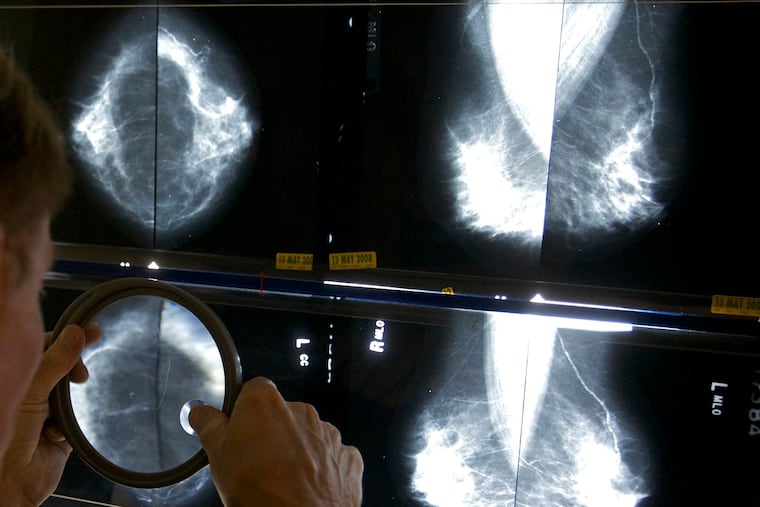Your insurance must soon cover genetic testing and MRIs — including copays — for breast cancer screenings in Pa.
Led by women for the first time, the Pennsylvania General Assembly sent its first bill to Gov. Josh Shapiro: one that requires insurers to cover the entire cost of annual breast screenings.

People across Pennsylvania at high risk for breast cancer will soon be able to get necessary screenings covered entirely by their insurance — including their copay and deductible — that advocates say will save lives by detecting the cancer earlier.
Led by women for the first time, Pennsylvania’s General Assembly sent its first bill to the governor’s desk: one that requires insurers to cover the entire cost of annual preventative screenings for MRIs, ultrasounds, and genetic testing in people at high risk for developing the disease.
Senate President Pro Tempore Kim Ward (R., Westmoreland), a breast cancer survivor and the first woman to lead the chamber, championed the bill. She and House Speaker Joanna McClinton (D., Philadelphia) came together with a bipartisan group of men and women donning pink ribbons — a symbol of breast cancer awareness — to celebrate the bill’s unanimous passage by the House on Wednesday. Gov. Josh Shapiro plans to sign the legislation into law.
“This is really a big day for women across Pennsylvania,” Ward said.
A 2020 law already covered the cost of breast cancer MRIs and ultrasounds. Pennsylvania has been a leader in requiring insurers to cover preventative care for women, such as mammograms, for decades.
However, the 2020 law did not cover the copays and deductibles, and insurers were not required to cover genetic testing. Senate Bill 8 goes a step further and ensures that there is no barrier for supplemental breast screenings, said Pat Halpin-Murphy, the president and founder of the Pennsylvania Breast Cancer Coalition and a breast cancer survivor.
“People don’t get screening tests when they don’t know how much they’re gonna cost,” Halpin-Murphy told The Inquirer. “Women, they’re not gonna take money out of their weekly budget to get a test.”
Early detection is key
Patients are at high risk if they have a family history of breast cancer, previously had the disease, or have dense breast tissue.
The U.S. Food and Drug Administration announced a new rule last month to require mammographers to notify patients about the density of their breasts. Breast tissue density can make it harder for mammographers to detect breast cancer, and dense breasts on their own are a risk factor for developing the disease.
Now in Pennsylvania, if a woman is told she has dense breasts, she can get an MRI — widely seen as the most sensitive breast cancer imaging test — at no cost.
Pennsylvania residents will now be eligible for genetic counseling and testing for the BRCA 1 and BRCA 2 genetic mutations, which greatly increase a person’s likelihood of developing breast cancer.
Preventive screenings are necessary to detect breast cancer early, and early detection can save insurers money in the long run, Halpin-Murphy said. The longer a person has untreated cancer, the more toxic and costly treatment will be.
During Wednesday’s news conference, McClinton noted a conversation she had with a pastor in her district who is a cancer survivor and recently got a mammogram. Her test came back with no evidence of the disease, but she sensed that she needed further testing, so she got an MRI. The MRI found that the disease returned again.
McClinton also noted that a breast cancer diagnosis can be a “death sentence” for Black women, with late detection as a main contributor. Black women have a slightly lower risk of developing breast cancer than white women, but a 40% increased death rate if they develop the cancer, according to a report from the American Cancer Society released last year.
“We gotta save our boobs,” McClinton said.
The bill will go into effect in 60 days once Shapiro signs it, but it may take about a year until a person’s insurance policy is updated.
30 years of advocacy
Halpin-Murphy has written a lot of bills over the years. Her advocacy organization has a 100% success rate in getting them into law, she said, “because we just keep at it.”
Ward during the press conference joked that her office has Halpin-Murphy’s phone number blocked.
“She has never stopped calling or pushing to get this done,” Ward added.
Halpin-Murphy told The Inquirer she first worked on legislation in the 1990s with former U.S. Rep. Allyson Schwartz, who was a state senator, to require insurers to cover the cost of mammograms.
Schwartz said she was one of only four women at the time in the state Senate’s 50-member body; there are now 16. She used her platform at the time to fight the insurance lobby and address a number of women’s health issues, including requiring insurers to cover injuries from domestic violence that she said insurers at the time often classified as a “preexisting condition.”
“It takes someone being a champion inside the legislature, the House or the Senate,” Schwartz said. “It takes interest groups and many women to speak up for themselves.”
Pennsylvania ranks 29th in the nation for female representation in state government, the highest in state history. There are 79 women serving in the General Assembly this legislative session, or about 31% — double the number in 2010.
Halpin-Murphy said she believes this legislation got priority because women lead both chambers for the first time.
“Senator Kim Ward is the first woman in 243 years to lead the Pennsylvania Senate, and Speaker Joanna McClinton is the first woman in 243 years to lead the House,” Halpin-Murphy said. “I think that’s why this bill is [getting passed]. They recognize the importance.”
The Ambler resident hopes the bill is the first one signed into law this year, which would make it “Act 1 of 2023.”